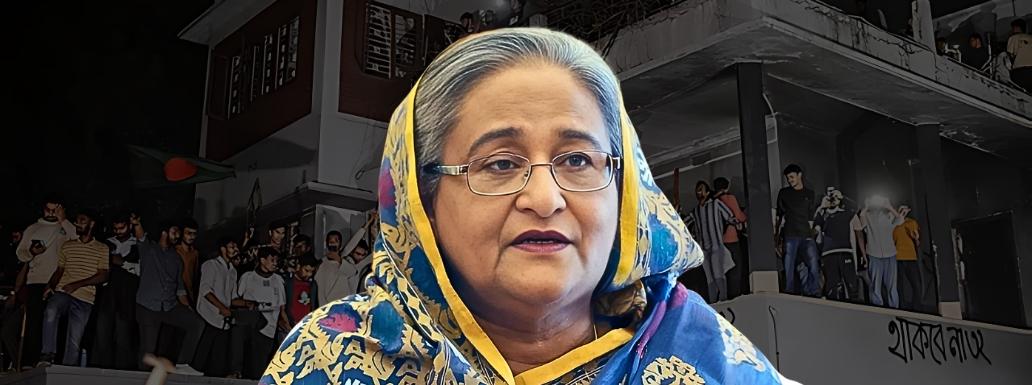Monday 16 February 2026
Anger at Sheikh Hasina Tarnishes a Freedom Fighter’s legacy in Bangladesh
Share

The political turmoil in Bangladesh reached a fever pitch as protesters vandalized and set fire to the former family home of deposed Prime Minister Sheikh Hasina, alongside the homes of other Awami League members. The incident, marked by its symbolic destruction, also led to the demolition of the museum that once served as the residence of Hasinas father, Sheikh Mujibur Rahman, the founding president of Bangladesh.
The unrest was triggered by Hasinas planned address to the nation via social media from India, where she has been in exile since student-led protests forced her from power last year. At 77, the former prime ministers two-decade rule has left a divided legacy. Critics labeled her an autocrat, accusing her government of electoral manipulation, suppressing dissent, and jailing opposition figures. Her fall from grace has intensified the hostility toward her political influence, with many attempting to erase any remaining symbols of her rule.
Destruction of a National Symbol
On Wednesday evening, an excavator was used to tear down Sheikh Mujibur Rahmans former home, which had been transformed into a museum honoring his contributions to Bangladeshs independence. Rahman, once celebrated as a national hero, now finds his legacy tainted by the resentment aimed at his daughter. Hasinas critics see the destruction of the museum as a symbolic purge of what they perceive as a corrupt dynasty.
Hasina took to Facebook Live to denounce the attacks, calling for “justice” against those responsible. “They can demolish a building, but they can’t erase history,” she declared. However, this has done little to quell the public outrage, with social media calls intensifying to remove what some protestors have dubbed the “pilgrimage sites of fascism.”
Sheikh Mujibur Rahman, often called the “Father of the Nation” in Bangladesh, was a pivotal figure in the country’s struggle for independence from Pakistan. Born on March 17, 1920, in Tungipara (then part of British India), Mujib was a charismatic leader and the driving force behind Bangladeshs liberation movement.
Mujib played a key role in advocating for the rights of Bengalis within Pakistan. He led the Awami League, which championed greater autonomy for East Pakistan (now Bangladesh). His landmarkSix-Point Movementin 1966 laid the groundwork for self-rule, demanding economic and political independence from West Pakistan.
In the1970 general elections, his Awami League secured a landslide victory, but the ruling Pakistani establishment refused to transfer power. This led to widespread protests, culminating in the declaration of independence on March 26, 1971, which triggered the Bangladesh Liberation War. Mujib was arrested by the Pakistani military and taken to West Pakistan, while his followers and Mukti Bahini fighters waged a nine-month war for independence.
After Bangladeshs victory in December 1971, Mujib was released and returned as the nations first Prime Minister. He attempted to rebuild the war-ravaged country but faced significant economic and political challenges. In 1975, he declared Bangladesh a one-party state under the BAKSAL system, aiming for centralized governance. However, this move alienated many and led to growing discontent.
On August 15, 1975, Mujib and most of his family wereassassinatedin a military coup. His two daughters, Sheikh Hasina and Sheikh Rehana, survived as they were abroad at the time.
The country has seen an increasing frequency of targeted attacks against the Hindu Minority in the country ever since Hasina was ousted. The former Prime Minister’s ouster has incentivized theradical groupswho are now acting out on a pretense of the oppressed groups rising up after the ouster of an autocrat.
As Bangladesh grapples with the chaos, the current administration led by Mohammad Yunus is facing mounting challenges. Yunus’ government is pushing for Hasinas extradition from India to hold her accountable for alleged economic mismanagement, including accusations of faking the countrys economic growth and laundering billions of dollars during her tenure. Meanwhile, Bangladesh is on the brink of aneconomic crisis, with Yunus pledging to hold elections by late 2025 or early 2026.
Newsletter
Stay up to date with all the latest News that affects you in politics, finance and more.